Doing business
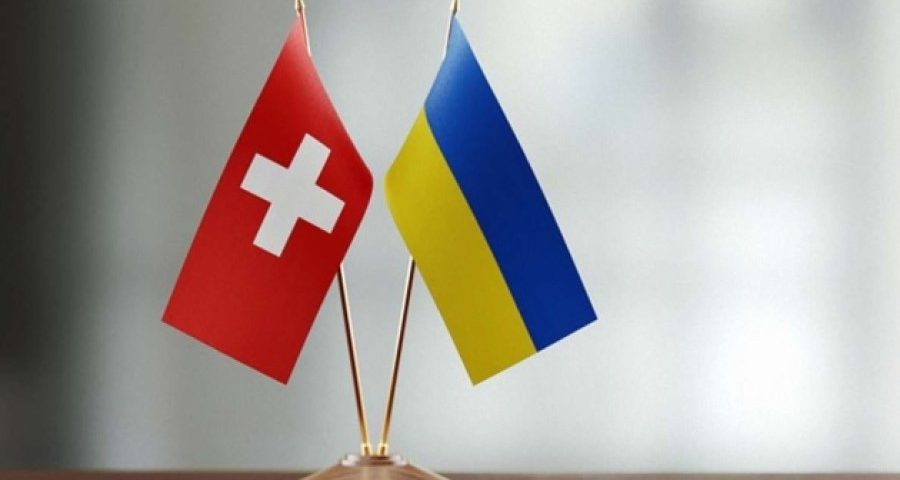
Since the beginning of the large-scale invasion of Ukraine by russia, Switzerland has been providing financial and humanitarian support to Ukraine, but excluding the military component. This is because since 1815, Switzerland has adhered to a policy of neutrality – it does not supply its weapons for warfare, does not provide other military assistance, and does not allow the re-export of its weapons to third countries.
But now Switzerland does not adhere to complete neutrality, as it has actually recognized the right of Ukrainians to defend themselves and joined international sanctions against russia. At the same time, Switzerland has joined the ban on the purchase and import of russian diamonds. It also imposed bans on imports of cast iron and liquefied petroleum gas (LPG). It also banned the export of a number of dual-use goods to russia, including chemicals, lithium batteries, drone engines, machine tools and machine parts. Also, russians will be prohibited from controlling cryptocurrency companies in Switzerland, and control over compliance with the price ceiling for russian oil will be strengthened. Additionally, the country is joining the ban on providing companies from russia with software for enterprise management, industrial design and manufacturing.
Also, for almost two years, Swiss politicians have been looking for legal options that would allow, in certain cases, the transfer of weapons to the warring parties despite Switzerland’s neutrality. This year, the Senate of Switzerland, the upper house of the country’s parliament, supported an amendment that allows the re-export of Swiss weapons and ammunition to Ukraine.
The Swiss Confederation is allocating 5 billion Swiss francs (over €5.53 billion) for Ukraine’s economic development and long-term recovery until 2036 as part of strengthening existing cooperation. The country is already supporting projects in Ukraine aimed at restoring destroyed civilian infrastructure in the energy, road, and healthcare sectors.
In the winter, Switzerland provided additional assistance to Ukraine in the amount of about €27.2 million. This assistance allowed for the repair of almost 1,000 apartments and houses and the distribution of heating materials to about 1,300 households in the frontline areas.
At the same time, the Government of Switzerland increased its support for the UN Humanitarian Fund’s assistance program in Ukraine by €1.9 million. These funds were used to provide heating, winter clothing, rental support and insulation of housing. In addition, as part of the winter assistance program of the United Nations High Commissioner for Refugees, €3.1 million was allocated for IDPs and citizens living in the territories affected by russian military aggression. In addition, the Swiss State Secretariat for Economic Cooperation is allocating €10.4 million to the Energy Support Fund.
Switzerland has handed over five fire trucks to Ukrainian rescuers and trained them to use them. The Swiss government also allocates more than €100 million for humanitarian demining in Ukraine over the next 4 years.
On July 8, the largest children’s hospital in Ukraine, Okhmatdyt, was damaged by rocket fire. After an initial assessment of the damage, Switzerland provided support to oncology patients, ensuring continuity of care and assistance to children and their families. In addition, Switzerland provided an air ambulance flight and admitted two young children with cancer, aged 4 and 11, for treatment. For the Kyiv hospitals that will hospitalize Okhmatdyt patients, beds, consumables, medical devices, medicines will be purchased, psychological support will be provided for patients and the presence of families and medical staff.
Switzerland has allocated €2.3 million to support milk production farms in seven regions, namely in the cities of Dnipro, Donetsk, Zaporizhzhia, Luhansk, Mykolaiv, Odesa and Kherson. Milk producers will be able to receive products for washing and disinfecting milking equipment, reagents for detecting latent forms of mastitis, disinfectants for livestock premises, etc., which will fully meet the three-month demand.
The Swiss Confederation continues to support Ukraine’s digital transformation and e-governance through the EGAP Program. The Federal Council has allocated €60.4 million for this purpose over the next four years. An important component of the success of Ukraine’s digitalization process is the Diia app, which is now used by more than 20 million Ukrainians and which Switzerland has supported since its launch. The new support package will focus on supporting digitalization in the areas of healthcare, education, and humanitarian demining in war-affected regions.
As part of the Swiss-Ukrainian EGAP program of the Eastern Europe Foundation, the Swiss Humanitarian Program office of the Swiss Embassy in Ukraine donated 64 defibrillators to Dnipropetrovsk region.
Developing mutually beneficial trade and economic cooperation also remains an important priority for the two countries. The analysis of export and import operations of the Dnipropetrovsk region with Switzerland demonstrates a high level of partnership, as the country is an important trading partner of the region.
According to the results of 2023, the volume of exports of goods from Dnipropetrovsk region amounted to $10.6 million and increased by 40% compared to the previous year. Among the goods in demand among Swiss consumers are seeds and fruits of oilseeds, ferrous metal products, furniture, fats and vegetable oils, cereals, wood and wood products, etc.
Export operations were carried out by 24 companies from Dnipropetrovsk region. The main exporting companies are metallurgical, food, agricultural and processing enterprises.
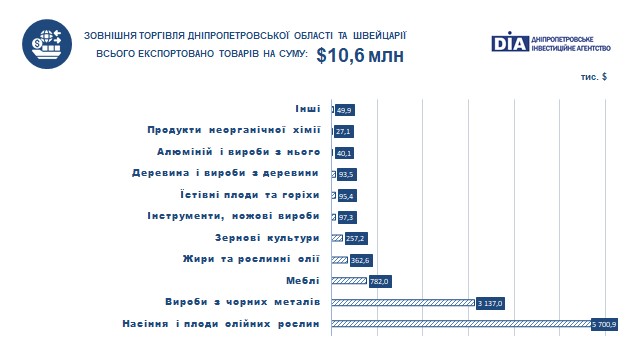
TOP-5 exporting companies (ranked by export volume):
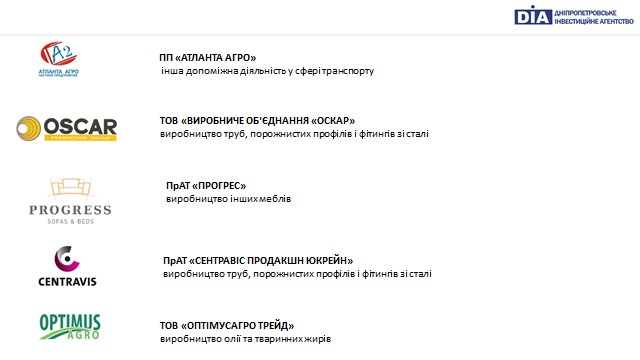
Imports of goods from Switzerland to the Dnipropetrovsk region amounted to $19 million and increased by 66.1% compared to 2022. Traditionally, Dnipropetrovsk region purchased machinery and equipment, pharmaceutical products, watches, optical, photographic, essential oils, and more.
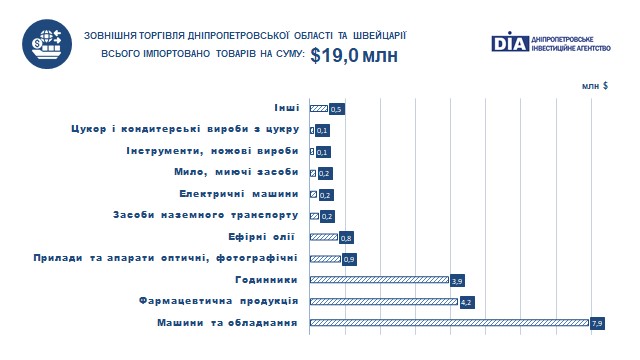
Import operations were carried out by 141 importers.
TOP-5 importers (ranked by volume of imported products):
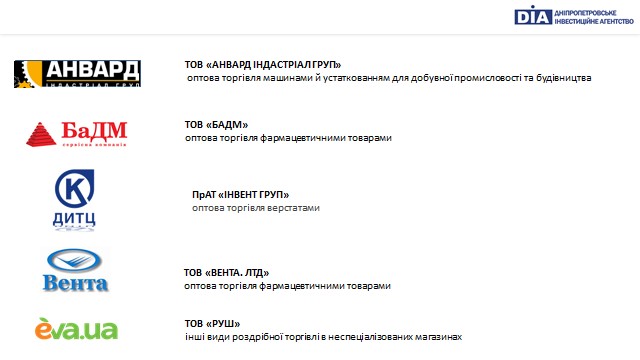
Imports were mainly carried out by pharmaceutical, trade, machine-building, and processing companies.
Source: information for the article was taken from open online sources